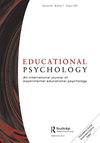The mental health and well-being of students and teachers during the COVID-19 pandemic: combining classical statistics and machine learning approaches
IF 3
2区 心理学
Q1 EDUCATION & EDUCATIONAL RESEARCH
引用次数: 4
Abstract
Abstract The aims of this study were to (1) to explore the state of students’ and teachers’ well-being and (2) examine the factors that predict their well-being during the pandemic-related school closures in the Philippines. Our sample comprised 733 students and 1168 teachers. During the height of the pandemic, 22.10% of the students and 13.44% of teachers met the cut-off for depression; 13.91% of the students and 15.92% of the teachers met the cut-off for anxiety. Both classical statistics and machine learning approaches were used to identify the roles of demographic, psychological, and socio-contextual factors that statistically predicted well-being outcomes. Results highlighted that family support was the strongest predictor of students’ and teachers’ positive well-being. For mental health outcomes, the strongest predictors of depression were anxiety and stress, while the strongest predictors of anxiety were depression, stress, and fear of COVID. Implications for students’ and teachers’ well-being amidst COVID are discussed.新冠肺炎大流行期间学生和教师的心理健康和福祉:结合经典统计和机器学习方法
摘要本研究的目的是(1)探索学生和教师的幸福状况,(2)研究在菲律宾与疫情相关的学校关闭期间预测他们幸福的因素。我们的样本包括733名学生和1168名教师。在疫情最严重的时期,22.10%的学生和13.44%的教师达到了抑郁症的临界值;13.91%的学生和15.92%的教师达到了焦虑的临界值。经典统计学和机器学习方法都被用于确定人口统计学、心理和社会背景因素在统计上预测幸福感结果的作用。研究结果强调,家庭支持是学生和教师积极幸福感的最强预测因素。就心理健康结果而言,抑郁的最强预测因子是焦虑和压力,而焦虑的最强预测因素是抑郁、压力和对新冠肺炎的恐惧。讨论了新冠肺炎对学生和教师幸福感的影响。
本文章由计算机程序翻译,如有差异,请以英文原文为准。
求助全文
约1分钟内获得全文
求助全文
来源期刊

Educational Psychology
Multiple-
CiteScore
6.40
自引率
6.20%
发文量
57
期刊介绍:
This journal provides an international forum for the discussion and rapid dissemination of research findings in psychology relevant to education. The journal places particular emphasis on the publishing of papers reporting applied research based on experimental and behavioural studies. Reviews of relevant areas of literature also appear from time to time. The aim of the journal is to be a primary source for articles dealing with the psychological aspects of education ranging from pre-school to tertiary provision and the education of children with special needs. The prompt publication of high-quality articles is the journal"s first priority. All contributions are submitted "blind" to at least two independent referees before acceptance for publication.
 求助内容:
求助内容: 应助结果提醒方式:
应助结果提醒方式:


